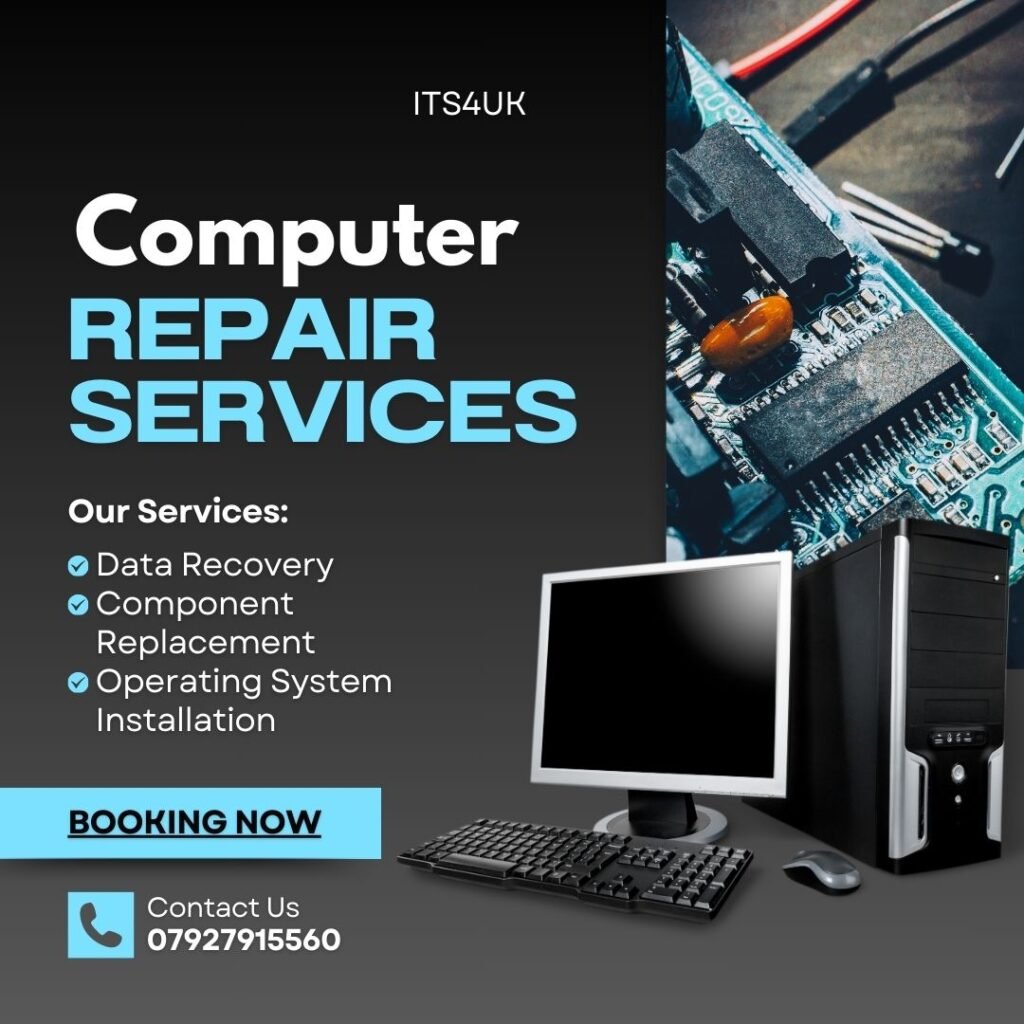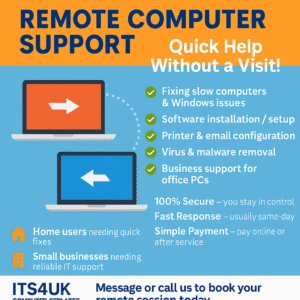Computer repair
Introduction
You’ve been using your laptop for years, and it’s always been one of your favorite pieces of technology. But recently, it’s started to slow down. You’re not sure what happened or why this is happening now. This is where you need computer repair in Humber and East Riding.
What could be causing this problem? Well, there are several causes for a slow system and some are fairly easy to fix. So don’t worry too much—we’ll get through this together!

Your laptop will not boot as quickly as it used to.
The boot time of your system is the time it takes for your system to start up.This can cause your laptop to run much more slowly. If you have several applications installed or if you have many programs open at the same time before powering it on.
The amount of RAM (random access memory) in your computer also affects how long it takes to boot. Adding more RAM is an easy way to improve boot speeds on older computers.
If you use a virtual machine manager like VMware Workstation or VirtualBox, any shared folders will be mounted as read-only until post-boot scripts have finished running. This can make it take a long time to use shared folders during initial startup sequences, like when installing software.
Please call Computer repair in Humber and East Riding 0792791560
You can’t watch videos or play games without your laptop slowing down.
If you’re using your laptop to play games, and your laptop is slowing down, it’s probably because the processor or graphics card is underpowered.
The demands of gaming and video editing are very high, so if your laptop has a weak processor or graphics card it may struggle.
If that’s the case with your computer then we recommend upgrading the processor or graphics card first before buying more RAM (which can be expensive).
If that isn’t an option then try closing all other programs before running intense software such as Photoshop in order to free up more processing power from other programs.
You have lots of programs running in the background that you don’t need.
You can view the list of programs that are running in the background of your computer by opening Activity Monitor.
To stop a program from running, simply click on it and select Quit from the drop-down menu.
If you know you don’t need a specific program, but want to keep it around for future use, click on Force Quit instead of Quit.
This will prevent the app from launching when you reboot or restart your device, but it will not stop child processes from launching automatically when you open them manually (more on this later).
Select More Details and Choose App For Selected Processes to end all programs except one. You will be asked to choose an application for each process; choose another if needed.
Your laptop is overheating.
If your laptop is overheating, it may be due to one or more of the following:
- Your laptop fans are not working properly.
- Your laptop is not ventilated properly.
- Your laptop is not in a well-ventilated area or too close to another heat source (such as another device).
- You’re using it for an extended period of time (like when you’re gaming all day).
Computer repair in Humber and East Riding
Make sure that your computer isn’t running too hot by opening up the Control Panel and clicking on “Hardware and Sound” > “Power Options.” From there, select “Choose what closing the lid does,” then select “Do nothing.” This will ensure that your computer won’t turn off when you close its lid while running games or other applications.
You have too many apps open at once.
There are a lot of apps open on your laptop.This can be found by counting the active windows in the bottom-right corner of your screen. If there are more than three, close some. Thank goodness closing apps is simple: click on any window until it expands, then click “x” near the top right corner (or right-click on each app). If everything else fails, restart your laptop by holding down the power button for 5 seconds until it goes off, then pushing it again.
You’re using an old hard drive.
If you’re using an old hard drive, one of the most common causes of a slow laptop is that it’s simply not fast enough to keep up with what you’re asking it to do.
Hard drives have gotten faster over time but they haven’t increased in capacity very much. In fact, most new computers ship with 5400 RPM drives that spin at about 5200 rpm (revolutions per minute). That’s less than half as fast as the 7200 rpm drives that were used as recently as five years ago! So if your laptop came with a 5400 RPM drive and now seems sluggish, replacing it with a 7200 rpm model will definitely help matters.
If space isn’t an issue for you—and many people don’t need more than the 250GB or 320GB of storage found on modern laptops—you can also upgrade from an HDD (hard disk drive) to an SSD (solid state drive). The difference here is that instead of storing data on spinning magnetic platters inside your computer case like HDDs do, SSDs use flash memory chips mounted directly onto the motherboard inside your computer case. Flash memory offers significantly faster read/write speeds than traditional HDDs do so upgrading will make everything feel snappier.
Your hard drive is full and out of storage space.
When your hard drive is full, it can cause your laptop to slow down. If you’re trying to free up storage space on your hard drive and don’t know where to begin, try cleaning up the following:
- Old files that are no longer needed. You might be surprised at how much space these take up! If a file is taking up tens of gigabytes of space, consider deleting it and reinstalling any programs that relied on those files (like Microsoft Office).
- Unnecessary programs. Do you have multiple web browsers installed? Do you use them regularly? If not—and if there are other browsers available for download in the Mac App Store or Microsoft Store—consider uninstalling one or more of them (but remember which ones were removed; if you need them again later on in life).
- Unnecessary photos, videos and music files. How many photos do you really need? Are they all backed up online somewhere else anyway? It’s easy enough to find out: just look through all folders on your computer until one appears with a very large number attached to it—that’s probably where all those old pictures are hiding!
There are several causes for a slow system and some are fairly easy to fix.
There are several causes for a slow system and some are fairly easy to fix. Running too many programs or apps at once can cause your system to slow down, as well as having too much storage space taken up by files that you don’t need anymore. Even if you’re using a brand new laptop with the latest operating system and all the bells and whistles, it’s possible that there’s something inside your computer that could be slowing things down. These include:
- Outdated hard drive
- Lack of RAM (memory)
- Overheating
Conclusion
There are many reasons why your laptop may be slow. If you don’t have the money to buy a new computer, then fixing it should be your first priority. You can get some of the best tips from this article and hopefully it will help you with your problem!
get in touch with Computer repair in Hull and East Riding


